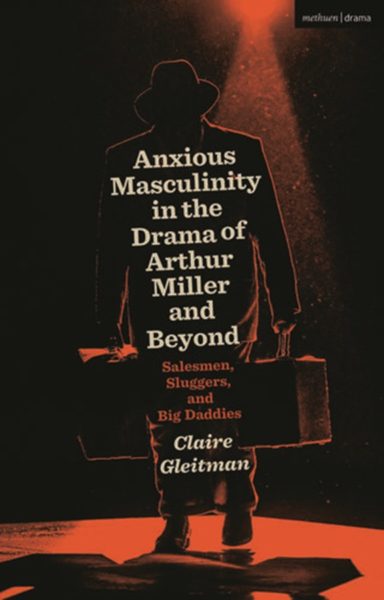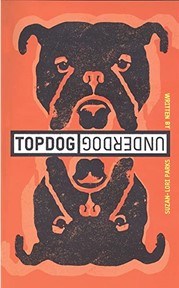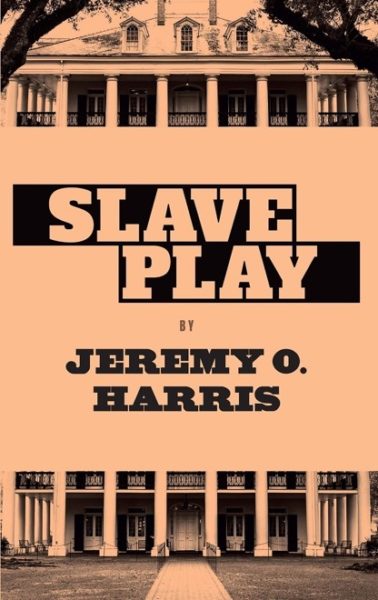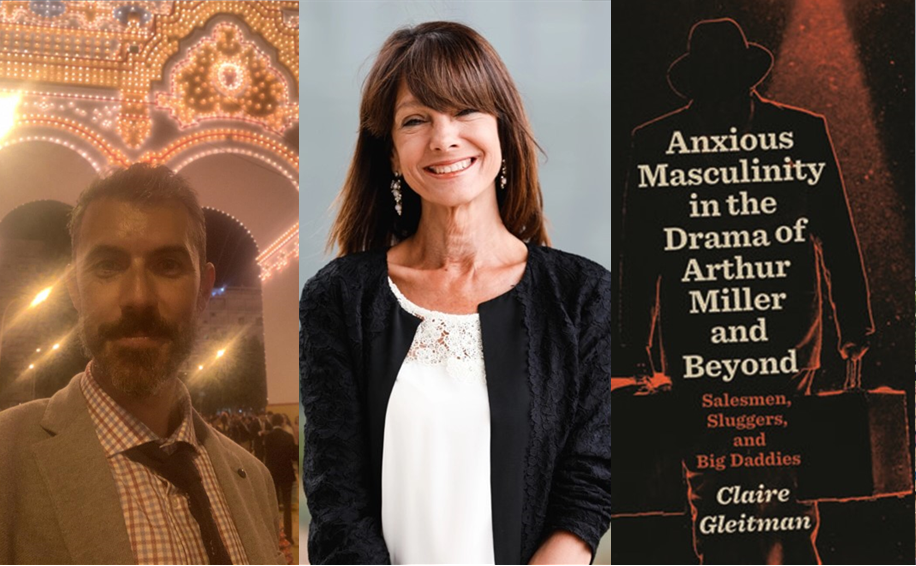There’s so much I could say about Claire Gleitman the woman, the colleague, the director, and the Dean, as she has been invaluable to my career and my happiness in this job. Her friendship has been an unwavering goodness in my life.

Claire Gleitman, author of “Anxious Masculinity in the Drama of Arthur Miller and Beyond”
But tonight, it is Claire’s scholarship that calls me to the lectern.
Claire’s book, “Anxious Masculinity in the Drama of Arthur Miller and Beyond: Salesmen, Sluggers, and Big Daddies,” out with the legendary Methuen Drama imprint, begins by confronting the dominant figure of 1950s American drama, the male breadwinner and his anxiety about displacement from the center of economic and cultural relevance. It traces its resonances outward to our contemporary moment.
The book uses Arthur Miller’s “Death of a Salesman” and its legendary loser, Willy Loman, as a Rosetta stone for understanding how gender, class, and race have preoccupied American plays in the 20th and 21st century. Claire reads the figure of the unmoored white patriarch as the key to decoding not only how playwrights have reacted to and represented the cultural anxieties of their times, but also how drama has returned again and again to Miller’s figuration of white desperation and its accompanying rage.

She pursues Miller and his playwright descendants as examples of the dramatizing of the anxious male, but also, more importantly, as a means of tracing our collective failure to reckon with the historical sins of racism, homophobia, and sexism. As Claire writes it, “this anxiety about displacement, about losing potency, centrality, and privilege in an increasingly heterogeneous America, is the story of our times.”
This is a book that in many ways upends the insular world of Arthur Miller studies.
Rather than treating Miller and his most enduring plays as artifacts of the mid-twentieth century and its particular conflicts and concerns, Claire shows that Miller’s importance is linked to the ways in which other playwrights are in conversation with his work.
Her early chapters go straight to Miller’s most recognizable plays, “All My Sons,” “The Crucible,” “A View from the Bridge,” and, of course, “Death of a Salesman,” unpacking his textured work with gender, what Claire calls “the tactics of toxic, anxious masculinity.” Claire’s deep familiarity with Miller’s language and the treatments of his work by scholars and directors is offered with her trademark clarity, beauty of prose styling, and broad insights into the relevance to our present day.

In the chapters that follow, Claire connects the DNA strands that link Miller to his near contemporaries, Tennessee Williams and Lorraine Hansberry, finding that a gendered, sexist, and ultimately racist value system is inescapable, and as such preoccupies the great American playwrights of the 20th century. Claire then leads us into a new century and a new generation of Miller’s descendants. She traces a line of unlikely inheritance from Miller to Tony Kushner, Paula Vogel, and Allison Bechdel.
In her work with these 21st century dramatists, we see some of Claire’s most original and groundbreaking work. Her dexterity with the language of these plays is matched by her ability to see historical periods as reenacting their dramas from the scripts of times past. For example, she writes of “Angels in America” “all of this is the process—practical, imaginative, visionary—that maybe, just maybe, can take us away from the toxicity of Roy Cohn’s formative years and our own, the brutally divided moment during and immediately following the Trump era.”

In one of the most powerful chapters in “Anxious Masculinity,” “Cake Walks and the White Gaze,” which closes out the book, Claire examines how black playwrights are still asking “whether Blacks in American can ever be freed from performing for a simultaneously uncomprehending and appropriating gaze.”

She goes on to read the work of those playwrights as daring their audiences to feel comfortable, to laugh, or to think themselves different than Americans of the 20th, 19th or even 17th centuries.
In doing so Claire asks the most poignant question of the book: Are we able to learn from the ugliness, vulgarity, and violence of our national history or will we remain unwilling to see the world from another’s eyes to understand that not all dances are danced for our enjoyment.

Claire closes her book on a note of hopefulness.
Trump’s appeal to exactly the form of anxious masculinity she traces through 20th and 21st century American drama failed to win him another term. She warns that Trump has succeeded in conjuring a powerful — perhaps the most powerful — collective mythology of our nation.
And there is little sign that this wounded, anxious, violent genie will return to his bottle anytime soon.
Trump has awakened “a version of American exceptionalism that trickles down to the suburban home and renders it familiar, pristine, safe from danger, lily-white, glisteningly fair in its unfairness.”
Claire makes Arthur Miller’s Willy Loman a clarion call to our present cultural emergency.
We are so lucky to have this book, and to have a scholar such as Claire Gleitman make theater so urgent.
A shorter version of this introduction was read at the international book launch for “Anxious Masculinity in the Drama of Arthur Miller and Beyond: Salesmen, Sluggers, and Big Daddies,” where theater studies scholar Sue Abbotson interviewed author Claire Gleitman. Sponsored by the Finger Lakes Environmental Film Festival and the Park Center for Independent Media, the launch was on September 21, 2022, on Zoom.
Chris Holmes is associate professor and chair of the Department of Literatures in English at Ithaca College. He is the creator and host of the literary podcast Burned by Books. His book, “Kazuo Ishiguro as World Literature” is under contract with Bloomsbury. His work has been published with Novel: A Forum on Fiction, Modern Fiction Studies, Critique, Contemporary Literature, Literature Compass, Diaspora, and Oxford’s Research Encyclopedia. He is co-editor with Kelly Mee Rich of the special issue: “Ishiguro After the Nobel” in Modern Fiction Studies, and with Thom Dancer, “The Novel at its Limits,” in Critique. Since 2011 he has been the co-organizer of the New Voices Literary Festival at Ithaca College.

